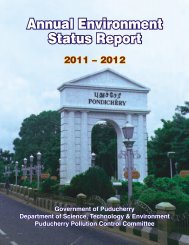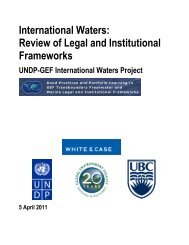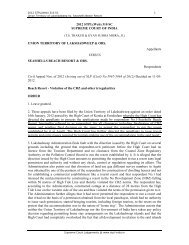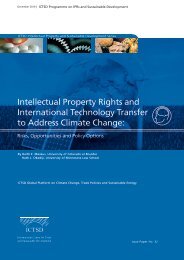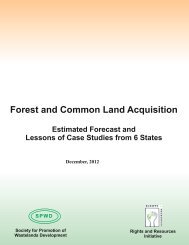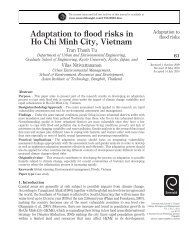DEFORESTATION AROUND THE WORLD - India Environment Portal
DEFORESTATION AROUND THE WORLD - India Environment Portal
DEFORESTATION AROUND THE WORLD - India Environment Portal
You also want an ePaper? Increase the reach of your titles
YUMPU automatically turns print PDFs into web optimized ePapers that Google loves.
146<br />
Deforestation Around the World<br />
the world. One of the consequences of deforestation is that the carbon originally held in forests<br />
is released to the atmosphere, either immediately if the trees are burned, or more slowly as<br />
unburned organic matter decays (Moutinho and Schwartzman, 2005). As reported by Diaz, et<br />
al., (2002), tropical deforestation in the Amazon alone is responsible for 2/3 of the Brazilian<br />
greenhouse gas emissions and it is estimated that 200 million tons of carbon, not including<br />
emissions from forest fires, are released annually into the atmosphere.<br />
The effect of deforestation on biodiversity and climate change has been the subject of scientific<br />
studies and many documentaries of media. Achard et al., 2002; Houghton, 2003; Fearnside and<br />
Laurance, 2004, revealed in their studies that Global deforestation and forest degradation rates<br />
have a significant impact on the accumulation of greenhouse gases (GHGs) in the atmosphere.<br />
The Food and Agriculture Organization (FAO, 2001) estimated that during the 1990s 16.1<br />
million hectares per year were affected by deforestation, most of them in the tropics. The<br />
Intergovernmental Panel on Climate Change (IPCC) calculated that, for the same period, the<br />
contribution of land-use changes to GHG accumulation into the atmosphere was 1.6±0.8 Giga<br />
(1 G = 109) tonnes of carbon per year (Prentice et al., 2001), a quantity that corresponds to 25%<br />
of the total annual global emissions of GHGs. The United Nations Framework Convention on<br />
Climate Change (UNFCCC), in recognizing climate change as a serious threat, urged counties<br />
to take up measures to enhance and conserve ecosystems such as forests that act as reservoirs<br />
and sinks of GHGs. The Kyoto Protocol (KP), adopted in 1997, complements the UNFCCC by<br />
providing an enforceable agreement with quantitative targets for reducing GHG emissions.<br />
Besides, Aina and Salau, (1992) and Adesina, (1997) reported that forest loss leads to loss of<br />
wildlife habitats and extinction of plant and animal species that play important roles in<br />
maintaining a balance in the environment.<br />
From the foregoing, it becomes obvious that the world tropical forest including Nigeria is<br />
depleting fast because of human influence. This is a problem at the macro and micro-level;<br />
such depletion is the result of government activities such as road development, arable<br />
farming, and land clearing for pasture (Osemeobo, 1991; Taylor et al., 1994; and Olofin,<br />
2000). Statistical estimates have also shown that there is a negative correlation between<br />
exploitation of the forest and conservation in Nigeria that is, the annual rate of forest los is<br />
greater than the rate of conservation (Osemeobo, 1990).<br />
The state of forests in general and tropical forests in particular, has been drawing the<br />
increasing disturbing attention of the world community. For instance, in the tropics, where<br />
about 2.5 billion people depend on natural forest resources for many economic and<br />
environmental goods and services, the depletion of forests has been posing threat to their<br />
means of livelihood.<br />
Recently, the United Nations initiated a global awareness through its Global <strong>Environment</strong>al<br />
Outlook 2000 (GEO, 2000). In the developed countries of Europe and America, this<br />
awareness is high and it is the cause of several policies and strategies aimed at<br />
environmental preservation and conservation. In developing countries the awareness is just<br />
emerging. Presently 115 nations have <strong>Environment</strong>al Protection Agencies (EPA) and more<br />
than 215 international environmental treaties have been signed on issues bothering on<br />
global warming, biodiversity, ocean pollution, ozone layer depletion, and export of<br />
hazardous wastes (Ibah, 2001).<br />
In Nigeria, government is also taking steps to correct the nation’s degenerated<br />
environmental condition. One of such efforts is the establishment of Federal <strong>Environment</strong>al<br />
Protection Agencies (FEPA), (now a department under the Ministry of <strong>Environment</strong>), with



